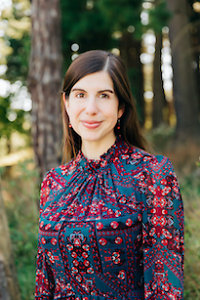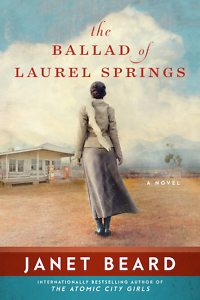Murder Songs and Mountain Secrets
A story of women bound by blood and music
The Ballad of Laurel Springs, the third novel from East Tennessee native Janet Beard, opens in 2019, with 10-year-old Grace assigned to write a family story. When a young aunt tells her that the well-known folk song “Pretty Polly” was actually written about the murder of one their distant ancestors, Grace has her topic — as well as the cause of a family crisis, a visit to the school counselor, and a growing awareness that her family harbors generations of secrets. Initials carved into an old oak seem to lend credence to the tale told in the song — one of dozens of so-called “murder ballads” within the bluegrass canon.

“Just because a story isn’t nice doesn’t mean it isn’t true,” young Grace concludes.
From that point forward, the book becomes historical fiction, with eight other women from the extended family telling their stories from spans of time scattered over the previous 128 years. While all the stories are compelling with a poignant ring of truth, most indeed turn out not nice. The speakers vary from barely educated farm wives to Harvard-educated novelists, narrating at different ages in different decades, unaware or only vaguely aware of those who have come before. Some are of different races. But all have in common childhoods surrounded by Appalachian music and adult lives surrounded by difficult men, some of them violent.
That violence is enshrouded not only in murder ballads, but even in old gospel tunes that feature “blood’ in every refrain. “It is such a thrill to hear these ancient songs be sung live right here in America,” exclaims a visiting educational reformer and temperance enthusiast upon hearing Pearl, Grace’s four-times-great-grandmother, sing in 1910. “You know, scholars say that the Elizabethan manner of speech is best preserved in Appalachia.”
 While Pearl isn’t so sure about the “Elizabethan” comment, she does note how the songs vary as they pass from one generation to the next — including the story of Polly, which has its roots in an earlier English tragedy. Musical experts like Fiona Ritchie have traced the historical and sociological pressures that carried such tunes from Ireland and Scotland to the studios of Johnny Cash and Emmylou Harris; Beard shares the musical evolution of Appalachian songs in ways that Illuminate character in her various narrators. Each successive chapter thus reveals the voice of a new woman along with the legacy of a different song. (Beard has posted audio snippets of her favorite versions of these songs in a playlist on her website.)
While Pearl isn’t so sure about the “Elizabethan” comment, she does note how the songs vary as they pass from one generation to the next — including the story of Polly, which has its roots in an earlier English tragedy. Musical experts like Fiona Ritchie have traced the historical and sociological pressures that carried such tunes from Ireland and Scotland to the studios of Johnny Cash and Emmylou Harris; Beard shares the musical evolution of Appalachian songs in ways that Illuminate character in her various narrators. Each successive chapter thus reveals the voice of a new woman along with the legacy of a different song. (Beard has posted audio snippets of her favorite versions of these songs in a playlist on her website.)
Place is as important as song to the unfolding family saga. The springs of the book’s title emerge high in the wilderness that will become a national park, but the primary fictional setting is Tate’s Valley at the base of the mountains, a sleepy hamlet that grows with the 20th century into a tacky tourist mecca resembling modern-day Gatlinburg. As in Beard’s 2018 novel Atomic Girls, which followed young women employed in the top-secret government town of Oak Ridge during World War II, the women of The Ballad of Laurel Springs feel a constant pull of landscape. At one point Carrie, a teenager who narrates during the late 1980s, sneaks off with an older, wilder friend into the national park at night:
We came to a clearing and the observation tower. When we got to the top, I stared, speechless, at the view. I’d seen it a dozen times before, but never in the dark with a thousand stars above me. The mountains loomed before us, massive even in the light of the moon. From a spot like that, you could think they went on forever, peak after peak, as limitless as the ocean.
Many years later, as a professional writer in New York City, Carrie reflects:
The biggest surprise of growing older has been to see how quickly and dramatically the world around me can change. In childhood, circumstances felt eternal, but now nothing seems to last. Landscapes transform; nations dissolve; climates change; people die. No wonder we cling to the fragments that somehow survive from one generation to the next — the stories we learned from our parents, the songs our grandmothers taught us.
These fragments, while sometimes disjointed in time and space, continually sung by different voices, nonetheless merge into a coherent whole, a distinctly Southern song that gets into the heads of readers and won’t let go.

Michael Ray Taylor is the author of Hidden Nature: Wild Southern Caves. He chairs the communication and theatre arts department at Henderson State University in Arkadelphia, Arkansas.


